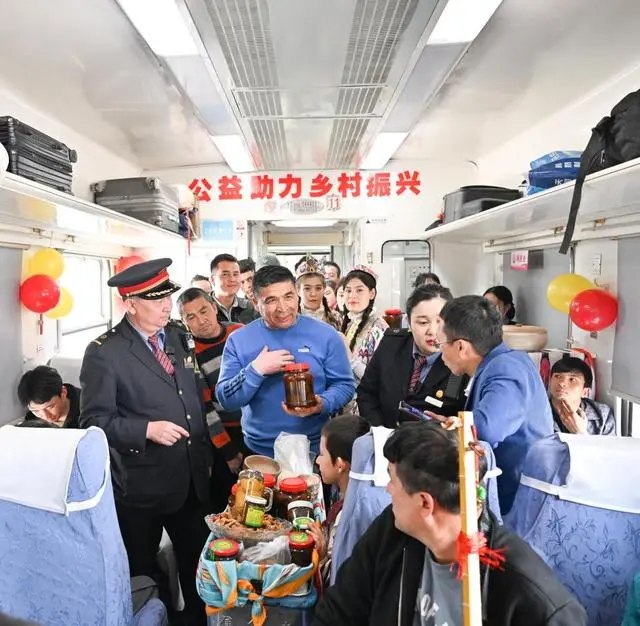Your current location:HOME >entertainment >Bazaar train boosts incomes for residents in Xinjiang, NW China 正文
TIME:2024-04-30 03:00:11 Source: Internet compilationEdit:entertainment
(People's Daily Online) 13:39, April 11, 2024Attending bazaars has been a longstanding tradition in
Attending bazaars has been a longstanding tradition in the southern part of northwest China's Xinjiang Uygur Autonomous Region.
After lunch, Kari Abdurexit from Shache county hurriedly made his way to the train station, carrying his handmade wooden bowls. At 5 p.m., he boarded train 7556 to participate in a bazaar held on the train.

Imammemet Sapar (center) sells his products onboard train 7556, April 3, 2024. (Xinhua/Li Xiang)
With an average speed of less than 80 kilometers per hour, the train has handled over 15 million passenger trips since its inception 13 years ago.
Bazaars have been organized inside the train's carriages regularly since 2021, helping local residents increase their incomes.
On designated bazaar days, the train carriages come alive with vibrant music as vendors showcase their homemade products, such as dried fruits, fruit jams, wooden bowls, and wooden spoons.
At 63 years old, Kari Abdurexit is no stranger to using electronic payment methods for his transactions. "Last month, I earned over 3,800 yuan ($525), and all of it is well-documented," he said with a smile.
With the central government's support and the implementation of the rural revitalization strategy, communication conditions and living standards in southern Xinjiang have steadily improved.
The introduction of e-commerce platforms and logistics parks has led to a significant increase in local online trading, with smartphone ownership and electronic payments becoming common practices among farmers and herders.
Imammemet Sapar from Artux sold over 70 cans of figs and began a livestreaming session to continue promoting his products.
By combining online and offline sales, his family's fig products are now being sold in regions as far as Shaanxi and Guangdong provinces, bringing in an annual income of around 200,000 yuan.
"Since its inception, the mobile bazaar on the train has facilitated the sale of various products worth millions of yuan for residents in southern Xinjiang," said the train conductor.
Pakistani FM Ishaq Dar designated deputy PM2024-04-30 02:55
Final survivor of USS Arizona after Pearl Harbor attack dies at 1022024-04-30 02:16
NASA's Europa Clipper survives environmental testing to prepare for launch in October2024-04-30 02:09
Chengdu Universiade2024-04-30 01:49
200 days into Israel2024-04-30 01:35
Chinese mainland warns against Taiwan military's provocations2024-04-30 01:35
China sees steady progress in diagnosis, treatment system: health official2024-04-30 01:12
Eurozone inflation further cools in March2024-04-30 01:02
After a near2024-04-30 00:39
Chengdu Universiade2024-04-30 00:39
Parents of Michigan high school shooter sentenced 102024-04-30 02:36
Gang violence takes toll on Haiti health facilities: UN2024-04-30 01:50
No casualties reported in Russian city of Orsk after dam breach2024-04-30 01:06
Cao Maoyuan: Chinese athlete shines as first gold medalist at Chengdu Universiade2024-04-30 00:55
Students in UK wowed by time2024-04-30 00:48
CPPCC member advocates for legislation on AI law2024-04-30 00:37
Hong Kong defends new security law2024-04-30 00:27
Giving China's treasures a modern touch2024-04-30 00:17
President Xi on global, regional security2024-04-30 00:17
Rare, endangered plants reintroduced into China's Three Gorges Reservoir area2024-04-30 00:15